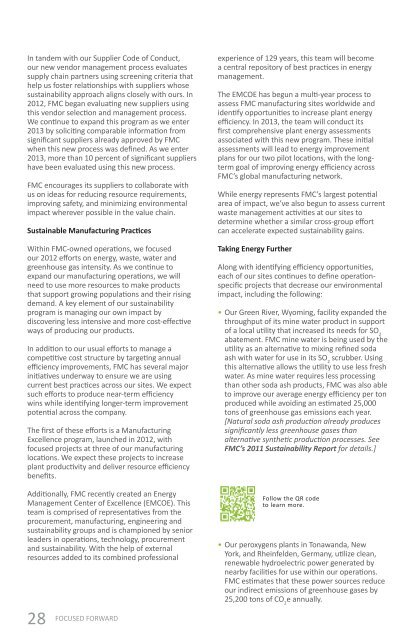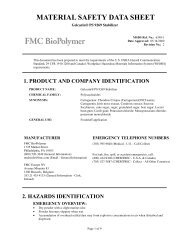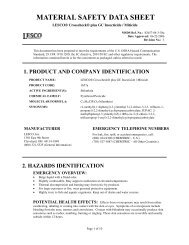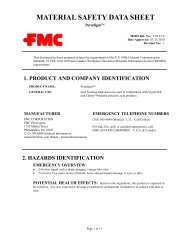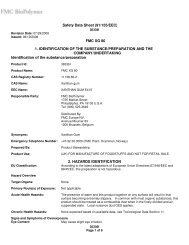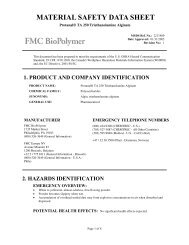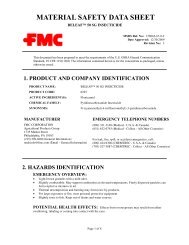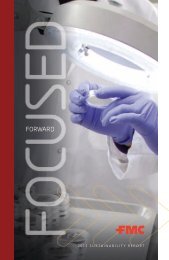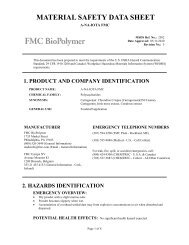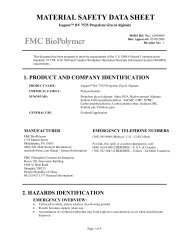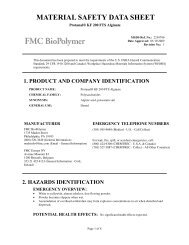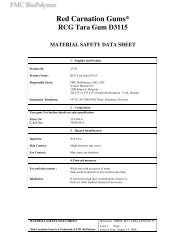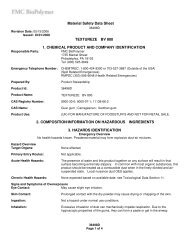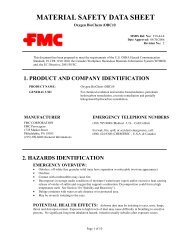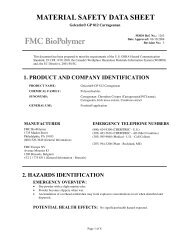Read the Report - FMC Corporation
Read the Report - FMC Corporation
Read the Report - FMC Corporation
You also want an ePaper? Increase the reach of your titles
YUMPU automatically turns print PDFs into web optimized ePapers that Google loves.
In tandem with our Supplier Code of Conduct,<br />
our new vendor management process evaluates<br />
supply chain partners using screening criteria that<br />
help us foster relationships with suppliers whose<br />
sustainability approach aligns closely with ours. In<br />
2012, <strong>FMC</strong> began evaluating new suppliers using<br />
this vendor selection and management process.<br />
We continue to expand this program as we enter<br />
2013 by soliciting comparable information from<br />
significant suppliers already approved by <strong>FMC</strong><br />
when this new process was defined. As we enter<br />
2013, more than 10 percent of significant suppliers<br />
have been evaluated using this new process.<br />
<strong>FMC</strong> encourages its suppliers to collaborate with<br />
us on ideas for reducing resource requirements,<br />
improving safety, and minimizing environmental<br />
impact wherever possible in <strong>the</strong> value chain.<br />
Sustainable Manufacturing Practices<br />
Within <strong>FMC</strong>-owned operations, we focused<br />
our 2012 efforts on energy, waste, water and<br />
greenhouse gas intensity. As we continue to<br />
expand our manufacturing operations, we will<br />
need to use more resources to make products<br />
that support growing populations and <strong>the</strong>ir rising<br />
demand. A key element of our sustainability<br />
program is managing our own impact by<br />
discovering less intensive and more cost-effective<br />
ways of producing our products.<br />
In addition to our usual efforts to manage a<br />
competitive cost structure by targeting annual<br />
efficiency improvements, <strong>FMC</strong> has several major<br />
initiatives underway to ensure we are using<br />
current best practices across our sites. We expect<br />
such efforts to produce near-term efficiency<br />
wins while identifying longer-term improvement<br />
potential across <strong>the</strong> company.<br />
The first of <strong>the</strong>se efforts is a Manufacturing<br />
Excellence program, launched in 2012, with<br />
focused projects at three of our manufacturing<br />
locations. We expect <strong>the</strong>se projects to increase<br />
plant productivity and deliver resource efficiency<br />
benefits.<br />
Additionally, <strong>FMC</strong> recently created an Energy<br />
Management Center of Excellence (EMCOE). This<br />
team is comprised of representatives from <strong>the</strong><br />
procurement, manufacturing, engineering and<br />
sustainability groups and is championed by senior<br />
leaders in operations, technology, procurement<br />
and sustainability. With <strong>the</strong> help of external<br />
resources added to its combined professional<br />
28<br />
FOCUSED FORWARD<br />
experience of 129 years, this team will become<br />
a central repository of best practices in energy<br />
management.<br />
The EMCOE has begun a multi-year process to<br />
assess <strong>FMC</strong> manufacturing sites worldwide and<br />
identify opportunities to increase plant energy<br />
efficiency. In 2013, <strong>the</strong> team will conduct its<br />
first comprehensive plant energy assessments<br />
associated with this new program. These initial<br />
assessments will lead to energy improvement<br />
plans for our two pilot locations, with <strong>the</strong> longterm<br />
goal of improving energy efficiency across<br />
<strong>FMC</strong>’s global manufacturing network.<br />
While energy represents <strong>FMC</strong>’s largest potential<br />
area of impact, we’ve also begun to assess current<br />
waste management activities at our sites to<br />
determine whe<strong>the</strong>r a similar cross-group effort<br />
can accelerate expected sustainability gains.<br />
Taking Energy Fur<strong>the</strong>r<br />
Along with identifying efficiency opportunities,<br />
each of our sites continues to define operationspecific<br />
projects that decrease our environmental<br />
impact, including <strong>the</strong> following:<br />
• Our Green River, Wyoming, facility expanded <strong>the</strong><br />
throughput of its mine water product in support<br />
of a local utility that increased its needs for SO 2<br />
abatement. <strong>FMC</strong> mine water is being used by <strong>the</strong><br />
utility as an alternative to mixing refined soda<br />
ash with water for use in its SO 2 scrubber. Using<br />
this alternative allows <strong>the</strong> utility to use less fresh<br />
water. As mine water requires less processing<br />
than o<strong>the</strong>r soda ash products, <strong>FMC</strong> was also able<br />
to improve our average energy efficiency per ton<br />
produced while avoiding an estimated 25,000<br />
tons of greenhouse gas emissions each year.<br />
[Natural soda ash production already produces<br />
significantly less greenhouse gases than<br />
alternative syn<strong>the</strong>tic production processes. See<br />
<strong>FMC</strong>’s 2011 Sustainability <strong>Report</strong> for details.]<br />
Follow <strong>the</strong> QR code<br />
to learn more.<br />
• Our peroxygens plants in Tonawanda, New<br />
York, and Rheinfelden, Germany, utilize clean,<br />
renewable hydroelectric power generated by<br />
nearby facilities for use within our operations.<br />
<strong>FMC</strong> estimates that <strong>the</strong>se power sources reduce<br />
our indirect emissions of greenhouse gases by<br />
25,200 tons of CO 2 e annually.


